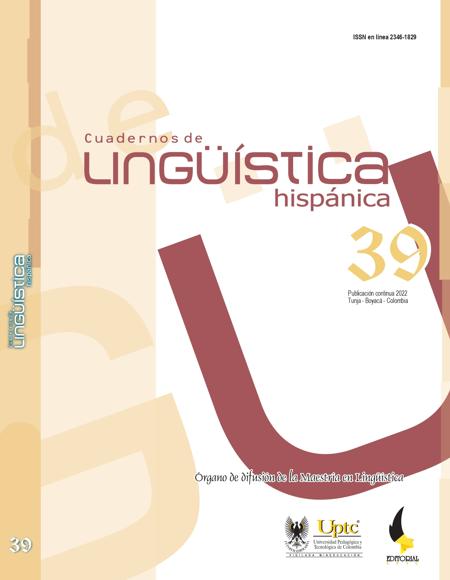The Ideology of Peace in the Semana Headlines

Abstract
The article analyzes the press headlines of the magazine Semana in order to unravel the ideology promoted by it regarding the peace process in the first fourth months of Iván Duque’s government. For this, the way in which the different postconflict actors were presented and named is identified, the discursive strategies used in the magazine were analyzed, in addition to the rhetorical language and its discursive implications. The paradigm that guides the study is the socio-critical one with a qualitative approach. The type of research is the critical analysis of the discourse. The analysis and interpretation method considers three stages: corpus exploratory, descriptive exploratory and analytical exploratory. A subcorpus of 23 headlines was taken. It is concluded that in its journalistic discourse the magazine creates and ideological structure about the beliefs, attitudes and values of different actors, establishing opinion groups in favor of the peace process and against the positions anddecisions of the president that harm the process.
Keywords
discourse analysis, peace process, ideology and power, journalistic discourse, written press
References
- Aguillón, P. & Molero, L. (2011). Estrategias ideológicas en la construcción de los titulares de sucesos en la prensa regional venezolana. Boletín de Lingüística, (23), 35-36. https://www.redalyc.org/articulo.oa?id=34723240002
- Álvarez, L. & Suárez, L. (2016). Análisis crítico del discurso en la apertura de los diálogos de paz en Colombia (2012). Cuadernos de Lingüística Hispánica, (28), 69-89.
- Cairo, H. & Ríos, J. (2019). Las élites políticas y la paz territorial en Colombia: un análisis de discurso en torno al Acuerdo de Paz. Revista Española de Ciencia Política, (50), 91-113. https://doi.org/10.21308/recp.50.04
- Chaoudri, I. (2016). Análisis discursivo de los titulares de prensa sobre la inmigración marroquí (2007-2013). (Tesis doctoral). Universidad de Alicante, España.
- Charaudeau, P. (2002). ¿Para qué sirve analizar el discurso político? Designis, (2), 109-124. http://www.designisfels.net/publicaciones/revistas/2.pdf
- Londoño, O. (2013). Entrevista a Teun A. van Dijk. Universidad de Ibagué.
- Monedero, J. C. (2016). Lenguaje, ideología y poder (2.a ed.) Ediciones Castilla.
- Ortiz, A. (2015). Enfoques y métodos de investigación en las ciencias sociales yhumanas. Ediciones de la U.
- Palacios, J. (2019). ¿A favor de quién? Análisis crítico de titulares y fotografías de prensa sudamericana, en el caso “Operación Libertad” -Venezuela. En 1er. Congreso Internacional de Ciencias Humanas. Humanidades entre pasado y futuro, Escuela de Humanidades, Universidad Nacional de San Martín, Gral. San Martín. https://www.aacademica.org/1.congreso.internacional.de.ciencias.humanas/1525
- Pardo, N. (2013a). Análisis crítico del discurso: conceptualización y desarrollo. Cuadernos de Lingüística Hispánica, (19), 41-62. https://revistas.uptc.edu.co/index.php/linguistica_hispanica/article/view/447
- Pardo, N. (2013b). Cómo hacer análisis crítico del discurso. Una perspectiva latinoamericana. Universidad Nacional de Colombia. https://repositorio.unal.edu.co/bitstream/handle/unal/20012/C%c3%b3mo%20hacer%20ACD.pdf
- Pizarro, T. (2018). Lenguaje, ideología y poder: posicionamientos desde la pragmática y el análisis crítico del discurso. Question, 1(58), e057. https://doi.org/10.24215/16696581e057
- Sánchez, J. P. (2006). El culturalismo: atrofia o devastación. Revista Perfiles Latinoamericanos, 27, 193-225. https://perfilesla.flacso.edu.mx/index.php/perfilesla/article/view/231/185
- Van Dijk, T. A. (1994). Discurso, poder y cognición social. En Conferencias en la Universidad del Valle, dictadas en octubre de 1994, Maestría en Lingüística. http://www.discursos.org/oldarticles/Discurso,%20poder%20y%20cognici%F3n%20social.pdf
- Van Dijk, T. A. (1996). La noticia como discurso, comprensión, estructura y producción de la información. Paidós Ibérica.
- Van Dijk, T. A. (1999). Ideología. Editorial Gedisa.
- Van Dijk, T. A. (2003). Ideología y discurso. Ariel Lingüística.
- Van Dijk, T. A. (2004). From Text Grammar to Critical Discourse Analysis. In T. A. vanDijk, From Text Grammar to Critical Discourse Analysis (p. 46). UniversitatPompeu Fabra. http://www.discourses.org/OldArticles/From%20text%20grammar%20to%20critical%20discourse%20analysis.pdf
- Van Dijk, T. A. (2009). Discurso y poder. Contribuciones a los estudios críticos del discurso. Editorial Gedisa. Van Dijk, T. A. & Rodrigo, I. (1999). Análisis del discurso social y político. Editorial Abya-Yala.
